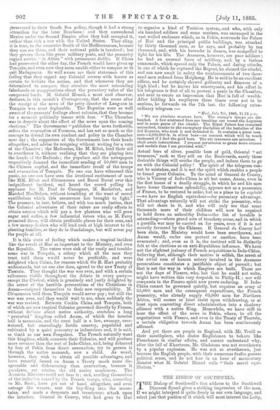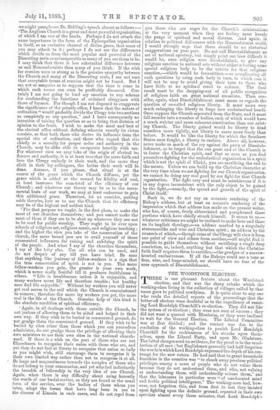THE BISHOP OF SOUTHWELL.
ril Bishop Bhop of Southwell's first address to the Southwell 1 Diocesan Synod gives a striking impression of the man. If we might interpret it quite freely in our own language, and select just that portion of it which will most interest the Laity, we might paraphrase Dr. Ridding's speech almost as follows :— ' The Anglican Church is a great and most powerful organisation, of which I am one of the heads. Perhaps I do not attach the same importance to the form of the Episcopalian organisation in itself, as an exclusive channel of divine grace, that some of you may attach to it ; perhaps I do not see the differences which divide us from the most popular and powerful of the Dissenting sects as so insuperable as many of you see them to be. I may think that there is less substantial difference between us and Nonconformists than many of you think. If the wish for reunion were as strong as is the genuine sympathy between the Church and many of the Dissenting sects, I am not sure that acceptable terms of reunion might not be found. But I am not so sanguine as to suppose that the time is come in which such terms can even be profitably discussed. Cer- tainly I am not going to lend my sanction to any scheme for confounding the functions of ordained clergymen with those of laymen. For though I am not disposed to exaggerate the significance of the priestly office, I know that the nature of ordination "would probably divide the Clergy into two sections as completely as any question," and I have consequently no intention of raising the question so as to bring that division of opinion to the front. I wish to make the most and best of the clerical office without defining wherein exactly its virtue consists, so that both those who derive its influence from the special rite of ordination, and those who regard that rite chiefly as a security for proper order and authority in the Church, may be alike able to co-operate heartily with me. For whatever view we may take of the origin of clerical in- fluence and authority, it is at least true that the more faith and love the Clergy embody in their work, and the more they elicit in their lay colleagues, the better their work will be done. Assume, if you please, that ritual is at the source of the grace which the Church diffuses, yet the grace which is added as the reward for fidelity and zeal, at least increases the sum-total of the efficiency of our Church ; and whatever our theory may be as to the sacra- mental basis of our work, we may at least endeavour to gain this additional grace. Therefore, let us consider, putting aside theories, how so to use the Church that its efficiency may be of the highest and noblest kind.
'For that purpose we ought, in the first place, to make the most of our churches themselves ; and you cannot make the most of them if they are to be shut up whenever they are not to be used for public worship. They ought to be ever open schools of religious art, religious music, and religious teaching ; and the higher the view you take of the consecration of the church, the more bound you are to avail yourself of these consecrated influences for raising and subduing the spirit of the people. And what I say of the churches themselves, • I say of the laity also. Use all who can be used, and do not despair of any till you have tried. Be sure that anything like jealousy of fellow-workers is a sign that the true consecration of spirit is not in you. The more fellow-workers you gain, the greater is your own work, which is never really fruitful till it produces fruitfulness in others. "Life is troublesome unless it is enjoyable, and many workers mean life and therefore trouble ; but healthy men find life enjoyable." Without lay workers you will never get real access to the evil which the Church is commissioned to remove ; therefore the more lay workers you get, the more real is the life of the Church. Genuine help of this kind is the absolute condition of spiritual efficiency.
Again, in all dealings with those outside the Church, be not jealous of allowing them to be aided and helped in their own way. If they wish to be buried in consecrated ground, do not grudge them the consecrated ground. If they wish to be buried by rites other than those which you can yourselves administer, do not grudge them the privilege of allowing their own ministers to use their own rites in the national church- yard. If there is a wish on the part of those who are not Churchmen to recognise their union with those who are, and yet they do not feel at liberty to recognise that union as fully as you might wish, still encourage them to recognise it in their own limited way rather than not to recognise it at all. • Be large and magnanimous towards the scruples of those who do not belong to your communion, and yet who feel indistinctly the breadth of fellowship in the very idea of our Church. Again, when there is any difficulty about using honestly the words of our burial-service, as they are found in the usual form of the service, over the bodies of those whom you inter, adopt the forms that have long been in use in the diocese of Lincoln in such cases, and do not repel from you those who are eager for the Church's ministrations at the very moment when they are feeling most keenly the pangs of spiritual and moral distress. And again, in relation to political differences with the Nonconformist world, I would strongly urge that there should be no rhetorical exaggerations on your part. Do not call Disestablishment an act of national apostacy, but simply point out how difficult it would be, once religion were disestablished, to give any religious sanction to national acts without either selecting some special religious body to be the vehicle for that religious sanction,—which would be favouritism,—or complicating all such questions by using each body in turn, in which case it will not be easy to avoid giving their turn to those who have little or no spiritual creed to enforce. The final result must be the dropping-out of all public recognition of religious faith on great national occasions. Then con- sider, again, what Disestablishment must mean as regards the question of so-called religious liberty. It must mean very much enlarging the liberty to forge new ecclesiastical bonds. Once suppose the Church separated from the State, and it must fall asunder into a number of bodies, each of which would have a much stricter and more coherent constitution than our exist- ing Church. The liberty gained would be liberty to bind ourselves more tightly, not liberty to move more freely than before. It would be like the liberty for which the Southern States once fought, a liberty to enslave. Above all, however, never make so much of the cry against the party of Disestab- lishment, as to forget that the one great end of the Church is to foster the Christian spirit, and that so soon as you find yourselves fighting for the ecclesiastical organisation in a spirit which is not the spirit of Christ, you are sacrificing the end to the means. Unless we can build up the Christian character at the very time when we are fighting for our Church organisation, we cannot be doing any real good by our fight for that Church organisation. The fight may and must be mischievous if it is in any degree inconsistent with the only object to be gained by the fight,—namely, the spread and growth of the spirit of Christ itself.'
Such is, we do not say an accurate rendering of the Bishop's address, but at least an accurate rendering of the impression which that address has made on the present writer, who has, of course, freely abbreviated and paraphrased those portions which have chiefly struck himself. It seems to us,— whatever criticisms we might be inclined to make here and there on its implicit theology,—an address marked by a singularly statesmanlike and wise and Christian spirit ; an address by the counsels of which,—though some of the Clergy will view it from one point of view and others from another,—all might find it possible to guide themselves without sacrificing a single deep conviction, or, indeed, anything but that which the Christian faith itself requires them to sacrifice,—the grudges of a narrow- hearted exclusiveness. If all the Bishops could use a tone as firm, wise, and large-minded, we should have no fear of the near approach of Disestablishment.



































 Previous page
Previous page